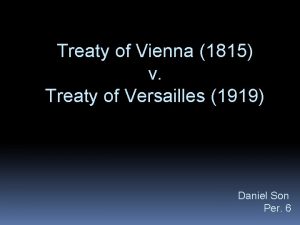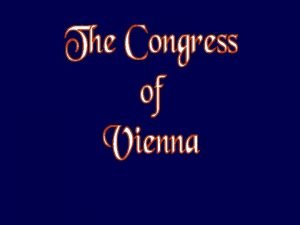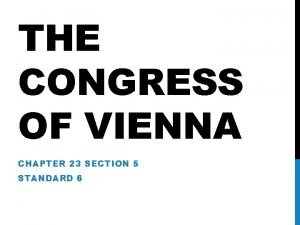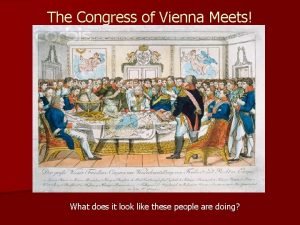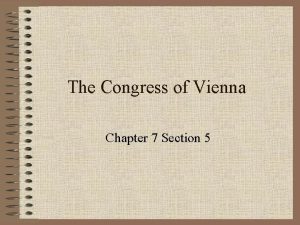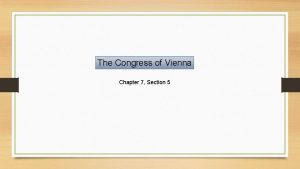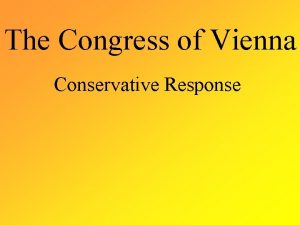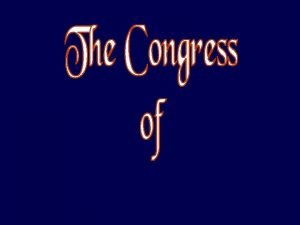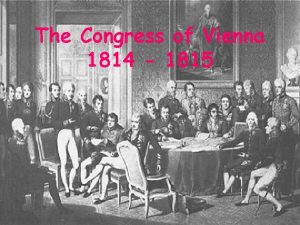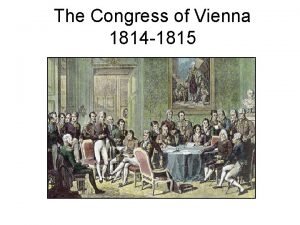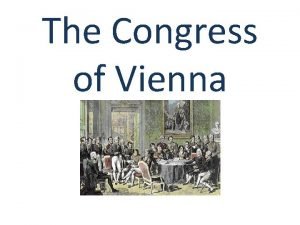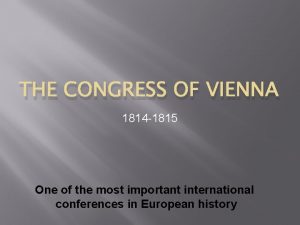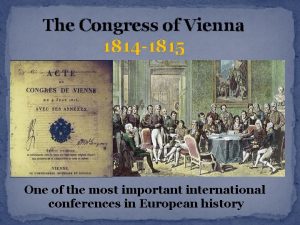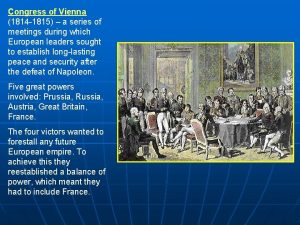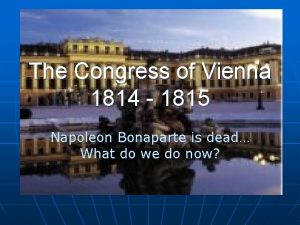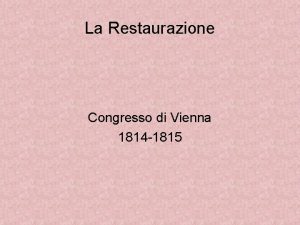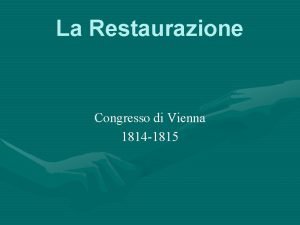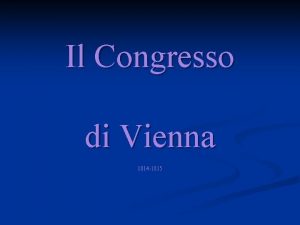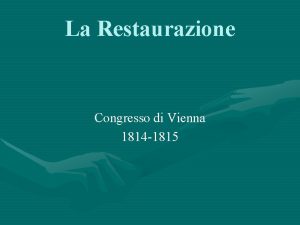Congress of Vienna and Napoleons Return 1814 1815















- Slides: 15

Congress of Vienna and Napoleons Return 1814 -1815

Restoration of the Monarchy • The Bourbons were restored to the throne; Louis XVIII. • Charter of 1814: the king created a two-house legislature that represented only the upper classes. • It was the first constitution in European history issued by a monarch. • The restoration maintained most of Napoleon’s reforms such as the Code Napoleon, the Concordat with the pope, and the abolition of feudalism.


The “First” Treaty of Paris 1814 • Treaty it signed May 30, 1814 • France surrendered all territory gained since the Wars of the Revolution had begun in 1792. • Allied powers imposed no indemnity or reparations (after Louis XVIII had refused to pay). • Napoleon was exiled to the island of Elba as a sovereign with an income from France. • The Quadruple Alliance agreed to meet in Vienna to work out a general peace settlement.


Congress of Vienna (Sept. 1814 - June 1815) • Representatives of the major powers of Europe, including France, met to redraw territorial lines and to try and restore the social and political order of the ancien regime. • The “Big Four” • Austria • Klemens Von Metternich represented • He epitomized conservative reaction to the French Revolution and its aftermath. • He opposed ideas of liberals and reformers because of the impact such forces would have on the multinational Hapsburg Empire. • Britain • represented by Lord Castlereagh. • He sought a balance of power by surrounding France with larger and stronger states.


• Prussia • sought to recover Prussian territory lost to Napoleon in 1807 and gain additional territory in northern Germany (e. g. Saxony). • Russia • Represented by Czar Alexander I • He demanded a “free” and “independent” Poland, with himself as its king. • France • later became involved in the deliberations. • Represented by Talleyrand, the French Foreign Minister • Congress of Vienna represents the triumph of conservatism in Europe

Principles of Settlement • Legitimacy • meant returning to power the ruling families deposed by more than two decades of revolutionary warfare. • Bourbons were restored in France, Spain, and Naples. • Dynasties were restored in Holland, Sardinia, Tuscany and Modena. • The Papal States were returned to the pope. • Compensation • meant territorially rewarding those states which had made considerable sacrifices to defeat Napoleon. • England received naval bases (Malta, Ceylon, Cape of Good Hope). • Austria recovered the Italian province of Lombardy and was awarded adjacent Venetia as well as Galicia (from Poland), and the Illyrian Provinces along the Adriatic. • Russia was given most of Poland, with the tsar as king, as well as Finland Bessarabia (modern-day Moldova and western Ukraine). • Prussia was awarded the Rhineland, 3/5 of Saxony, and part of Poland. • Sweden received Norway

• Balance of Power • The encirclement of France was achieved through the following: • End of the Hapsburg Holy Roman Empire • Sardinia (Piedmont) had its former territory restored, with the addition of Genoa. • A compromise on Poland was reached—“Congress Poland” was created with Alexander I of Russia as king; it lasted 15 years. • Only Britain remained as a growing power as she began her century of world leadership from • It arranged the map of Europe so that never again could one state upset the international order and cause a general war. A strengthened Netherlands United the Austrian Netherlands (Belgium) with Holland to form the Kingdom of the United Netherlands north of France. • Prussia received Rhenish lands bordering on the eastern French frontier (left bank of the Rhine). • Switzerland received a guarantee of perpetual neutrality. • • Austrian influence over the German states was enhanced by creating the German Confederation (Bund) of 39 states out of the original 300, with Austria designated as President of the Diet (Assembly) of the Confederation. • It maintained Napoleon’s reorganization. • It was a loose confederation where members remained virtually sovereign. •

Hundred Days (March 20 - June 22 1815) • Napoleon capitalized on the stalled talks at Vienna and escaped Elba for France. • The Hundred Days began on March 1, 1815, when Napoleon landed in the south of France and marched with large-scale popular support, into Paris. • He seized power from Louis XVIII, who fled Paris. • Napoleon raised an army and then defeated a Prussian army in Belgium on June 16, 1815.

The Endgame • Battle of Waterloo- June 1815 • Last battle of the Napoleonic Wars • Napoleon was defeated in Waterloo, Belgium, by England’s army led by the Duke of Wellington and Prussian forces. • Napoleon was exiled to the South Atlantic island of St. Helena, far off the coast of Africa, where he died in 1821. • The “second” Treaty of Paris (1815): the Quadruple Alliance now dealt harshly with France in subsequent negotiations. • It contained minor changes to the borders previously agreed to. • France had to pay an indemnity of 700, 000 francs for loss of life.


Evaluating Napoleons Reign It was the first egalitarian dictatorship of modern times. • • Positive Achievements Revolutionary institutions were consolidated. • The French gov’t was thoroughly centralized. • He made a lasting settlement with the Church. • Spread positive achievements of the French Revolution to the rest of Europe • • Impact on Other Countries Serfdom was abolished in much of Germany by 1807. • Germany was reorganized into 39 states. • Prussia and Austria, for selfpreservation, reformed their military and provided some reforms. •

• Liabilities • Repressed individual liberty • Subverted republicanism • Oppressed conquered peoples throughout Europe • Caused terrific suffering as a result of war
 Treaty of vienna 1815
Treaty of vienna 1815 Congress of vienna map before and after
Congress of vienna map before and after Chapter 23 section 5 the congress of vienna
Chapter 23 section 5 the congress of vienna Did the congress of vienna succeed
Did the congress of vienna succeed Chapter 23 section 5 the congress of vienna pdf
Chapter 23 section 5 the congress of vienna pdf Congress of vienna worksheet
Congress of vienna worksheet Congress of vienna meets
Congress of vienna meets The congress of vienna chapter 7 section 5
The congress of vienna chapter 7 section 5 Chapter 7 section 5 the congress of vienna
Chapter 7 section 5 the congress of vienna Congress of vienna conservatism
Congress of vienna conservatism Chapter 23 section 5 the congress of vienna
Chapter 23 section 5 the congress of vienna Congress of vienna simulation
Congress of vienna simulation Chapter 23 section 5 the congress of vienna
Chapter 23 section 5 the congress of vienna Congress of vienna quiz
Congress of vienna quiz Chapter 7 section 4 napoleons empire collapses
Chapter 7 section 4 napoleons empire collapses Napoleon's downfall worksheet
Napoleon's downfall worksheet
